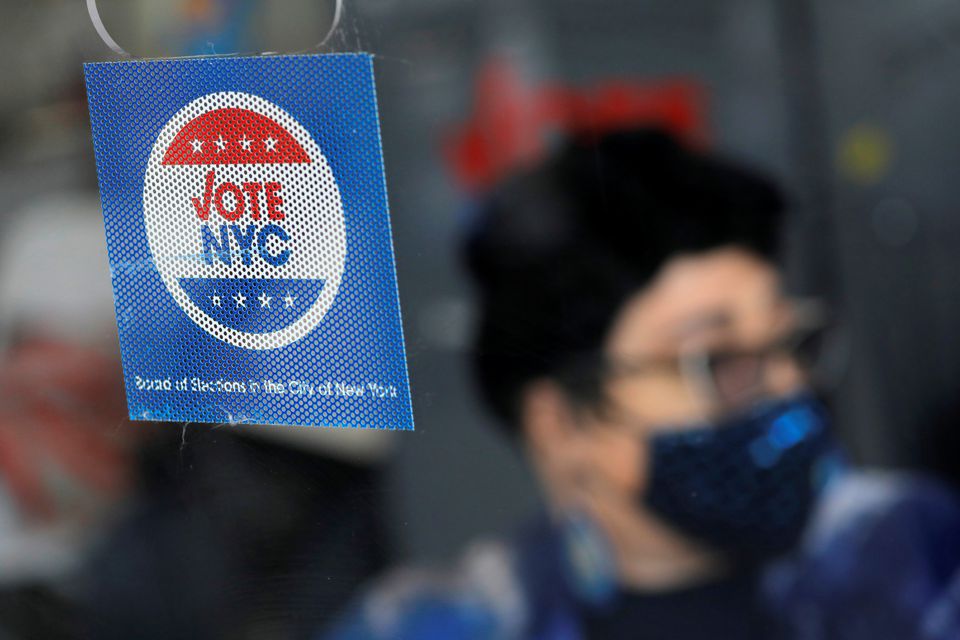The NYC Primary Mess
Eric Adams appears to have won a confusing race that isn't quite over.

Three headlines that more-or-less tell the story:
- AP, “Eric Adams wins Democratic primary in NYC’s mayoral race“
- NYT, “Highlights From N.Y.C. Mayoral Primary: Eric Adams Declares Victory“
- TPM, “Adams Leading After Newest Vote Dump In Tumultuous New York Mayoral Race“
The vote won’t be certified for several more days but Brooklyn Borough President Eric Adams looks almost certain to be the Democratic nominee and, therefore, the probable next mayor of New York City. As the AP report notes,
Adams will be the prohibitive favorite in the general election against Curtis Sliwa, the Republican founder of the Guardian Angels. Democrats outnumber Republicans 7-to-1 in New York City.
There’s no reason to suspect any chicanery here but the sheer incompetence of the counting process will leave supporters of the other contenders confused and angry.
The TPM account illustrates this better than the straight news sources:
After the new dump, Adams leads former Sanitation Commissioner Kathryn Garcia by one percentage point, or 8,426 votes.
The updated tally Tuesday — delayed hours after the city board of elections predicted this round of results would be published — comes after a dizzying couple of weeks in the race, during which a BOE fumble punctuated the city’s first ever use of ranked-choice voting.
The Tuesday dump included tens of thousands of ballots cast absentee, and was expected to give a clearer picture of who will ultimately win. The winner of the Democratic primary will be the heavy favorite for the November general election.
Adams led the initial rounds of counting, but Garcia made up significant ground in the batch of ballots published last week.
Last Tuesday, the BOE threw the race into upheaval when it published new tallies, only to later cryptically retract the data with little explanation beyond a “discrepancy” in the numbers it was working to fix.
Late that night, the board explained that it had failed to remove sample ballots from the vote totals, skewing the numbers. It later corrected and re-posted the totals.
The snafu caused proverbial forehead smacking among proponents of the new voting system, which New York voters approved during a 2019 ballot measure. Those good government advocates worry that the BOE’s screw-up will scare off other states and localities from using the method. They’ve been quick to emphasize that the problem in New York was not specific to ranked-choice voting.
The NYC BOE is apparently notorious for cronyism and incompetence but, again, there’s no evidence that I’ve seen indicating anything other than the latter here. The combination of rules intended to maximize voting, including allowing absentee ballots to be mailed at the last minute, and a new ranked-choice voting system meant that there were going to be bugs and delays.
While he didn’t lead early, Adams had become the favorite late in the race. So much so that other candidates formed an alliance hoping to defeat him:
[S]ome groups have been keeping a close watch on particularly the Adams campaign, which raised concern when it attacked a last-minute campaigning partnership between Garcia and former presidential candidate Andrew Yang — a common practice in ranked-choice elections — as nefarious and specifically intended to suppress a Black candidate and Black voters. If Garcia overtook Adams during the rounds of counting, they worried, he may resurrect those damaging arguments.
But, of course, the whole point of ranked-choice voting is to reflect the true preferences of voters. Yang, who had been an early frontrunner, wound up getting so few first-place votes that he dropped out on election night. So, if his supporters truly preferred Garcia over Adams, it only makes sense that their votes get reallocated to her once Yang was eliminated.






I’m inclined to cut New York some slack over this. They’re trying something new with a mostly volunteer workforce. There’s bound to be a certain amount of confusion.
@David Schuler:
I wouldn’t be. The BOE in NYC is political patronage incarnate. It’s where everybody parks their political IOUs who are too dumb / incompetent to be of any practical use anywhere else. Among New Yorkers, the BOE being a wasteland of ineptitude is an article of faith.
They also had two years to prepare. Frankly, speaking as a former New Yorker, I’m amazed that it ran as somewhat smoothly (i.e. they actually have a declared winner) as it did.
@David Schuler: I figure that real assessments of how this all really went will have to wait until everyone gets over the immediate desire to know the winner.
The normal (and understandable, to a degree) impatience with wanting to know the outcomes in the context of new rules understandably leads to amplified frustration.
Of course, if the problem is the usage of volunteers and corruption, it would be nice if the city would seek to fix those problems–not that one should likely hold one’s breath.
@Steven L. Taylor:
That’s almost certainly right.
But, with the exception of absentee ballots, I continue to be baffled that we can’t count votes faster. We live in the age of computers. Even RCV should just be an algorithm adjustment.
And they’ve done an awful job of messaging. The false count based on the test ballots was an egregious own-goal. But simply releasing results as though it was a horse race is just a bad idea. People will naturally be suspicious when the election night “leader” is suddenly overtaken as new votes come in. RCV naturally compounds this if the counting is slow.
True. I wonder if there won’t be serious perception issues with RCV. Election night projections aren’t necessary, but everybody’s used to it, and Trump was going to try to lock it in if FOX hadn’t called AZ for Biden. And voters are conditioned to expect election night forecasts. But forecasting with RCV has to be nearly impossible.
To amplify your main point, I see Adams had a three to 2 edge over Garcia in first place votes, but ended up winning 50.5 to 49.5. A margin that close could have easily gone the other way. Then Adams supporters would be screaming that voters clearly wanted their guy but Garcia won on some technical mumbo jumbo. The algorithm is simple, but I see problems trying to explain the vote count to innumerate low information voters (which is to say almost all of them). Your NYT link has a simple 3×3 matrix showing the top three names, their first choice votes, and the final margin after the RCV shakeout. The process between initial and final is a black box, taken on faith. Easy enough to audit, but I’m trying, and failing, to picture a simple graphic that would explain the process inside the black box. (Easy to explain a simple example, but the actual NY vote?)
New York was the last state to quit using lever machines, possibly the least accurate voting method ever widely deployed in the US. It took a federal court order to force them into compliance. Sometimes I think they just don’t care.
It appears Mr. Adams – former cop, political moderate – was supported most strongly by POC, while Ms. Garcia and Ms. Wiley, both progressives who favor serious reform of the NYPD, won among rich white people who don’t need police protection.
Democrats need to stop assuming that the issues that animate progressives are the same issues that move POC. We could even consider the radical idea that skin color and ethnicity are not the only relevant factors and start looking at Black and brown voters in detail rather than assuming they’re ‘ours’ because we’re the good guys.
@gVOR08:
There’s an anecdote that when the Greek generals voted as to who deserved most credit for victory in the Battle of Salamis, where they beat back the Persian fleet, each commander voted for himself in first place, and for Themistocles in second.
Versions differ on whether he was awarded credit and glory, but the point is clear: in ranked choice voting, the person with most votes for first choice is not necessarily ahead of the person with the most second choice votes plus enough first choice votes to beat them.